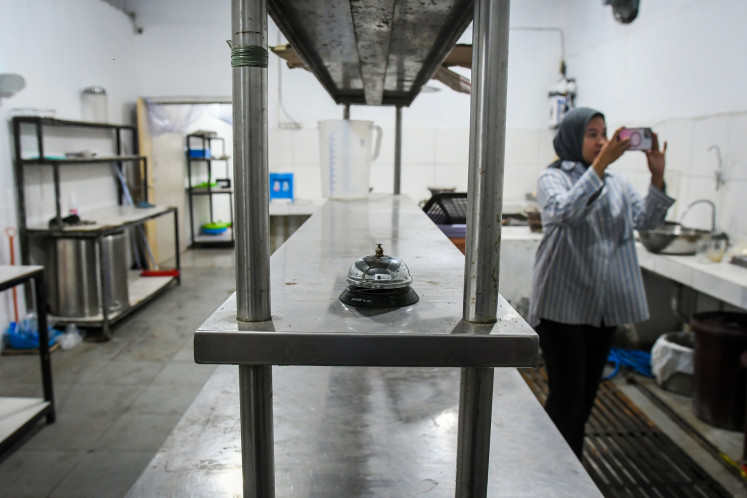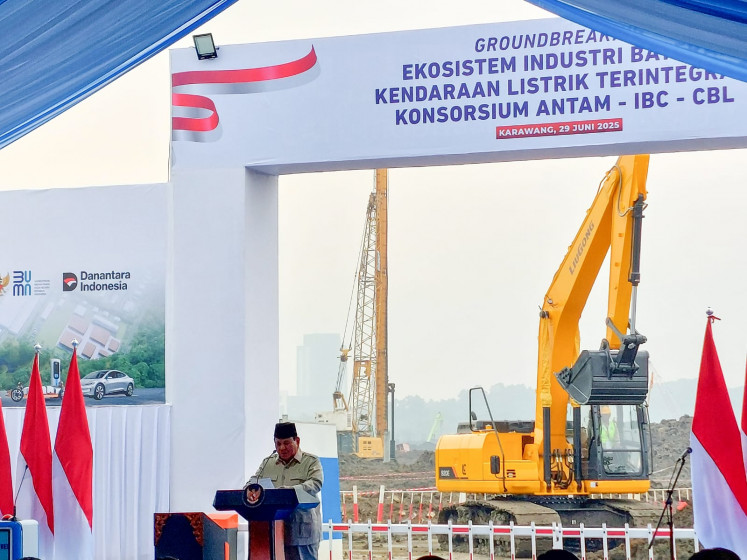Popular Reads
Top Results
Can't find what you're looking for?
View all search resultsPopular Reads
Top Results
Can't find what you're looking for?
View all search resultsInsight: The wrong understanding of how liberal democracy works
It is wrong to claim that a political party or movement has won an election, because doing so polarizes participation into fixed ideas that suppress the free choice of citizens and slows the emergence of new solutions (to be verified) to problems of human cohabitation.
Change text size
Gift Premium Articles
to Anyone
 Let’s get this party started: Mayoral candidate Muhamad and his running mate Rahayu Saraswati Djojohadikusumo arrive at the South Tangerang General Elections office on Friday in an old-fashioned public transport vehicle known as an oplet to register as for the December regional election. (JP/Dhoni Setiawan)
Let’s get this party started: Mayoral candidate Muhamad and his running mate Rahayu Saraswati Djojohadikusumo arrive at the South Tangerang General Elections office on Friday in an old-fashioned public transport vehicle known as an oplet to register as for the December regional election. (JP/Dhoni Setiawan)
P
olitics cannot be reduced to a win-or-lose dichotomy. It is wrong to claim that a political party or movement has won an election, because doing so polarizes participation into fixed ideas that suppress the free choice of citizens and slows the emergence of new solutions (to be verified) to problems of human cohabitation.
This is what we are experiencing in this moment in history, with even some (self-styled) liberals having abandoned the experimental approach in favor of the conformist uniformity of ideas, rendered inconsistent by time. Ideas naturally prevail as a result of free choices made by citizens, who are the sole winners or losers, depending on how their choices play out.
In representative – or parliamentary – democracies, our expectations and needs, as citizens, seek representation in the ideas and projects pursued by political movements, precisely to respond to our demands.
Political proposals, encapsulating ideas and projects, compete with one another. Increased competition at once reflects and gives rise to greater diversity. The goal is to best represent diversity in addressing society's problems.
To this end, we need electoral laws that ensure greater expression of diversity, both by qualitatively broadening participation in the legislature, and by expanding what is on offer in terms of political movements to include – but not homogenize – the diversity of projects from which to choose (because representation thrives on choice).
Furthermore, there is a need for other forums for exchange, aside from the legislature, where diversity can be expressed and give rise to political projects.
In this context, rather than winners or losers, there are prevailing projects, backed by the citizens. With citizens' support comes responsibility. Indeed, it is the citizens who stand to win or lose, depending on whether those who represent them succeed in bringing the relevant projects to fruition, thus improving the freedom and prosperity of each individual.
It is therefore fundamentally wrong to compete with the aim of winning above all else. Likewise, it is dangerous to announce a winner, and naive to celebrate. Victory relies on another's defeat.
Democracy does not work that way. Nobody is defeated, except for citizens who pinned their hopes on projects that ultimately failed. Democracy involves working together to ensure that the projects that prevail are highly representative and can respond to our various needs as citizens. This involves a specific experimental approach, the objective of which is to constantly try new solutions, appropriate to the evolving times.
The culture of winners and losers is not tied to an approach, but instead takes refuge in fixed, unchanging ideas, with the sole aim of winning the vote, rather than seeking to make the project work. And so the goal is no longer to solve the problems, but instead to use those problems as a means of gaining support from citizens.
The goal is to win the vote. This is at the heart of the polarization we are currently experiencing: citizens are taking refuge in immovable ideas, even at the cost of defeating those who are different. Diversity is not an asset to draw on, but an enemy to suppress.
The terminology is not incidental, it has cultural roots. It is fueled by the media, and social media in particular. The terms "winner" and "loser" are used to simplify the concept of prevalence, but they are inappropriate, and their use is not coincidental. Rather it is cultural, in keeping with historicist logic, which sees one idea win out over others that, in turn, are victims of that idea, to which everyone conforms. Only a revolution can unseat the dominant idea, in favor of the alternative.
A revolutionary narrative style is easier to digest, cognitively, because it pushes us toward one idea, spurning the other and its supporters. Using a very simple framework (right or wrong, black or white, etc.), the winner draws admiration and contempt, as does the loser. It is a model that polarizes citizens, hindering tolerance and, consequently, the recognition of diversity and of alternative solutions to real problems.
Representative democracy proves weak in this context, because citizens prefer simple, clear solutions (even if they are short-sighted) to the complex dynamics of democratic conflict. And when the demiurgic effect of polarization wears off (for example during an economic crisis), revolution follows, which in turn sets the polarization process in motion once again.
There can be no advancement of knowledge without constant conflict, because revolutions involve rejecting what came before, to replace it with apparent innovations. Apparent innovations, because they do not respond to everyday experimentation, as is typical of democratic conflict, but instead re-propose the same content in different forms.
And so, as is currently the case, we remain tied to old frameworks, opposed to one another, to deal with every new issue the world presents.
It is critical that we urgently abandon this rigid framework, to return to democratic conflict. This change can only be driven by liberals. But too many, betraying the spirit of liberalism, remain attached to the past, hostile to the present, making no effort to understand what is happening.
--------
Business professor at Temple University, Rome, adjunct assistant professor of business administration at John Cabot University and cofounder of Competere think tank









